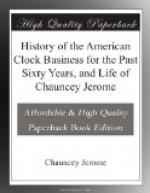when it was due, if my life was spared, and he finally
consented to let me go. When it came due I walked
to Farmington, fifteen miles, paid him and walked
back the same day, feeling relieved and happy.
I obtained the job of finishing the inside of a dwelling
house, which gave me great encouragement. The
times were awful hard and but little business done
at anything. It would almost frighten a man to
see a five dollar bill, they were so very scarce.
My work was about two miles from where I lived.
My wife was confined about this time with her first
babe. I would rise every morning two hours before
day-light and prepare my breakfast, and taking my
dinner in a little pail, bid my good wife good-by for
the day, and start for my work, not returning till
night. About this time the Congregational Society
employed a celebrated music teacher to conduct the
church singing, and I having always had a desire to
sing sacred music, joined his choir and would walk
a long distance to attend the singing schools at night
after working hard all day. I was chosen chorister
after a few weeks, which encouraged me very much in
the way of singing, and was afterwards employed as
a teacher to some extent, and for a long time led
the singing there and at Bristol where I afterwards
lived. The next summer was the cold one of 1816,
which none of the old people will ever forget, and
which many of the young have heard a great deal about.
There was ice and snow in every month in the year.
I well remember on the seventh of June, while on my
way to work, about a mile from home, dressed throughout
with thick woolen clothes and an overcoat on, my hands
got so cold that I was obliged to lay down my tools
and put on a pair of mittens which I had in my pocket.
It snowed about an hour that day. On the tenth
of June, my wife brought in some clothes that had
been spread on the ground the night before, which were
frozen stiff as in winter. On the fourth of July,
I saw several men pitching quoits in the middle of
the day with thick overcoats on, and the sun shining
bright at the same time. A body could not feel
very patriotic in such weather. I often saw men
when hoeing corn, stop at the end of a row and get
in the sun by a fence to warm themselves. Not
half enough corn ripened that year to furnish seed
for the next. I worked at my trade, and had the
job of finishing the inside of a three-story house,
having twenty-seven doors and a white oak matched
floor to make, and did the whole for eighty-five dollars.
The same work could not now be done as I did it for
less than five hundred dollars. Such times as
these were indeed hard for poor young men. We
did not have many carpets or costly furniture and
servants; but as winter approached times seemed to
grow harder and harder. No work could be had.
I was in debt for my little house and lot which I
had bought only a short time before, near the center
of Plymouth, and had a payment to make on it the next
spring. I proposed going south to the city of




